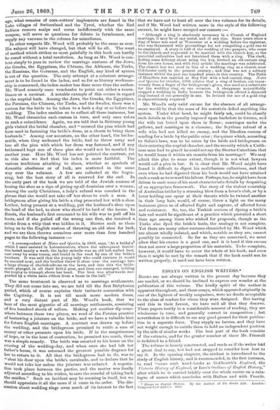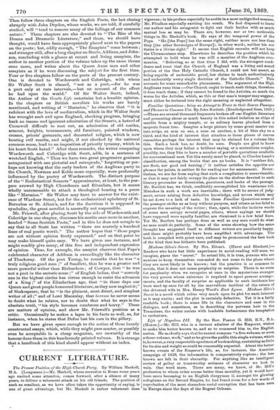ESSAYS ON ENGLISH WRITERS.*
Booics are not always written in the present day because they are needed, or we should be inclined to express our wonder at the publication of this volume. The kindly spirit of the author is apparent throughout, and these essays, which appeared originally in one of the lightest of weekly magazines, were no doubt acceptable to the class of readers for whom they were designed. But having said this in their favour, we have said all that they deserve. These papers testify to a considerable amount of reading, they are wholesome in tone, and generally correct in composition ; but nevertheless it is difficult to see any good ground for their publication in a separate form. They supply no lacuna, and they have not weight enough to entitle them to hold an independent position by the side of similar works. The best part of the book consists of the extracts, and for the greater number of these Mr. Friswell is indebted to a friend.
The volume is loosely constructed, and reads as if the writer had a great deal to say, but had not stopped to consider how best to say it. In the opening chapters, the student is introduced to the study of English history, and is recommended, in the first instance, to read "some such hand-hooks as Goldsmith's England, the Victoria History of England, or Ice's Outlines of English History," after which he is carried briskly over the whole course on a catalogue of names which concludes with Hallam and with Fronde.
Then follow three chapters on the English Poets, the last closing abruptly with John Dryden, whose works, we are told, if carefully studied, will "tend to remove many of the failings of our common nature." Three chapters are also devoted to "The Rise of the Drama and Dramatic Literature," and these, we should have thought, would have been appropriately placed next to the papers on the poets ; but, oddly enough, "The Essayists" come between ; and stranger still, after a long chapter on Steele, Addison, and John
son, concluding with a glance at recent and living essayists, the author in another portion of the volume takes up the same theme once more, and writes about the Queen Anne men and other essayists as if he were discussing the subject for the first time. Four or five chapters follow on the poets of the present century. One is devoted to Wordsworth and Coleridge, with whom Sir Walter Scott is classed, "not as a poet,—for he was a poet only at rare intervals,—but on account of the effect be had upon the world." Of Sir Walter Scott, indeed, the Author of the Gentle Life entertains but a bumble opinion. In the chapters on British novelists his works are barely mentioned, and writing of " Marmion," he observes that "it is redolent with the love of mediaavalism, which in Sir Walter Scott has wrought such evil upon England, checking progress, bringing back an insane and ignorant admiration of the Stuarts, a hatred of Cromwell difficult to root out, an admiration of old castles, armour, knights, tournaments, old furniture, painted windows, crosses, priests' garments, and decorated religion, which is now bearing evil results, and might, if not checked by the national common sense, lead to an imposition of priestly tyranny, which in his heart Scott hated." After these remarks, the writer comparing Wordsworth and Coleridge with Scott, adds, in a sentence of wretched English, "'Thus we have two great progressive geniuses antagonized with one pictorial and retrograde," forgetting or perhaps not knowing that the early leaders of the Anglican party in the Church, Newman and Keble more especially, were profoundly influenced by the poetry of Wordsworth. The distinct purpose of the "Ecclesiastical Sonnets" approximates, at least, to the purpose avowed by High Churchmen and Ritualists, but it seems wholly unreasonable to attach a theological bearing to a poem like" Marmion." Sir Walter may have to answer for the existence of Wardour Street, but for the ecclesiastical upholstery of St. Barnabas or St. Alban's, and for the doctrines it is supposed to symbolize, the great novelist is assuredly not responsible.
Mr. Friswell, after placing Scott by the side of Wordsworth and Coleridge in one chapter, discusses his merits once more in another, headed "Some Scottish Poets," and in this he does not scruple to say that in all Scott has written "there are scarcely a hundred lines of real poetic worth." The author hopes that "these pages are not without opinion freely expressed," and on that point he may make himself quite easy. We have given one instance, and might readily give many, of this free and independent expression of opinion. Thus, for example, the essayist observes that Pope's celebrated character of Addison is exceedingly like the character of Thackeray. Of the poet Young, he remarks that he was "a truly religious good man ;" of Smollett, that he was a greater and more powerful writer than Richardson ; of Cowper, that "he was not a poet in the esoteric sense ;" of English ladies, that "scarcely one in the highest circles has virtue enough to resist the advances of a King ;" of the Elizabethan age, that "in those days our Queen and great people honoured literature, as they now neglect it;" of Shakespeare, that he "is the plainest, most direct, and simplest writer of all ;" and of Lord Macaulay, that because he never seems to doubt what he relates, nor to doubt that what he says is the absolute truth, "his style becomes cumbrous and heavy." These are matters of opinion, and show Mr. Friswell's position as a critic. Occasionally he makes a lapse in his facts as well, as, for instance, when he states that Defoe lost his ears in the pillory.
Bat we have given space enough to the notice of these loosely constructed essays, which, while they might pass muster, or possibly even be acceptable in a cheap magazine, are unworthy of the honour done them in this handsomely printed volume. It is strange that a handbook of this kind should appear without an index.































 Previous page
Previous page